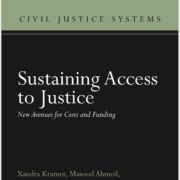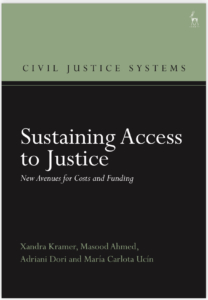As some readers will have seen through various other blogs and social media, this month the book Research Methods in Private International Law. A Handbook on Regulation, Research and Teaching, edited by Xandra Kramer (Erasmus University Rotterdam/Utrecht University) and Laura Carballo Piñeiro (University of Vigo) was published. The book is part of the Handbook in Research Methods of Law Series of Edward Elgar Publishing.
“The book seeks to provide insights into the different methodological approaches to private international law from both a regulatory approach and from a research and educational perspective. Established methodologies as well as evolving regulatory and empirical approaches that shape the future of private international law are discussed. To this end, the book is structured in three parts that correspond to three core debates, although they inevitably overlap: (I) the classification of private international law as private law and its interaction with international public law and regulation; (II) inter- and multidisciplinary approaches and research methods; and (III) how private international law helps to frame and address the critical debates of our time as well as the role of legal scholarship and education in shaping the future of private international law.” (Introductory Chapter, p. 1-2).
The book contains 18 chapters written by a team of authors spanning all continents discussing classical themes of private international law and new challenges in regulation, research, and teaching. It includes views from politics, human rights, legal theory, soft law and private regulation, comparative law, empirical studies, economics, EU law making, technology, laymen, feminism, colonialism, as well as university teaching in Mexico, Nigeria and The Netherlands.
Contributors are (in alphabetical order): María Mercedes Albornoz, Adriani Dori, Diego P. Fernández Arroyo, Sai Ramani Garimella, Marco Giacalone, Paola Giacalone, Nuria González-Martin, Christoph A. Kern, Mary Keyes, Patrick Kinsch, Dulce Lopes, Cristina M. Mariottini, Ralf Michaels, Chukwuma Samuel Adesina Okoli, Marta Pertegás, Giesela Rühl, Veronica Ruiz Abou-Nigm, Carlota Ucín, Aukje van Hoek, Christopher Whytock, and Abubakri Yekini.
Further information is available on the publisher’s website here. The Prelims and the introductory chapter by the editors ‘Private international law in a global world: a revival of methodologies and research methods’ are freely accessible here. Critical acclaim by Geert Van Calster (KU Leuven), Yuko Nishitani (Kyoto University), Hans van Loon (former SG Hague Conference on Private International Law) and Symeon C. Symeonides (Willamette University College of Law).
Save the Date! Two launch webinars will take place on:
- 10 September 2024, from 10-12am CET: Research Methods in Private International Law: Views from Regulation, Research and Education (confirmed speakers include Dulce Lopes, Diego Fernández Arroyo, Giesela Rühl, Adriani Dori and Mary Keyes)
- 23 September 2024, from 10-11.30 CET: Research Methods in Private International Law: Educational Perspectives (co-organised by the University of Sydney, moderated by Jeanne Huang; confirmed speakers include Veronica Ruiz Abou-Nigm/Ralf Michaels, Ramani Garimella, Abubakri Yekeni & Chukwuma Okoli and Aukje van Hoek
More details and information on registration will follow soon.
For those interested, a report of an extensive online interview with the editors by Young-OGEMID can be downloaded from the website of Transnational Dispute Management.





